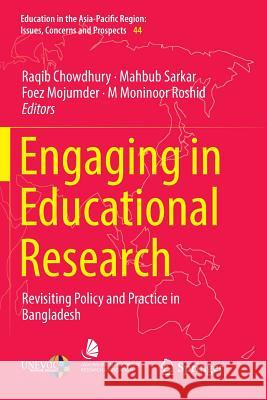Engaging in Educational Research: Revisiting Policy and Practice in Bangladesh » książka



Engaging in Educational Research: Revisiting Policy and Practice in Bangladesh
ISBN-13: 9789811344848 / Angielski / Miękka / 2018 / 351 str.
Engaging in Educational Research: Revisiting Policy and Practice in Bangladesh
ISBN-13: 9789811344848 / Angielski / Miękka / 2018 / 351 str.
(netto: 536,72 VAT: 5%)
Najniższa cena z 30 dni: 539,74
ok. 22 dni roboczych.
Darmowa dostawa!
1 Education in Bangladesh: Changing contexts and emerging realities.- Section 1 Access, Equity and Quality in Education.- 2 Policy-relevant Education Research: A study of access, quality and equity in Bangladesh.- 3 Analysing Bottlenecks to Equal Participation in Primary Education in Bangladesh: An equity perspective.- 4 Education in Emergencies: Examining an alternative endeavour in Bangladesh.- 5 Students' Sense of Belonging in Urban Junior Secondary Schools in Bangladesh: Grades, academic achievement and school satisfaction.- 6 Social Class Systems in Communicative Language Teaching in Bangladesh.- 7 Secondary School Teachers' Views on Inclusion of Students with Special Educational Needs in Regular Classrooms.- 8 Teachers as Leaders and Learners: Building teacher leadership in Bangladeshi.- 9 Collaborative Partnerships Within Communities of Practice: The need for school-based action research in Bangladesh.- Section 2 Reformation of Curriculum, Assessment and Teacher Development.- 10 The Promotion of Science Values: Science teachers' perspectives and practices.- 11 "School Sciences is Irrelevant": Why still do Science? A case study on secondary students in Bangladesh.- 12 An Analysis of the Secondary School Certificate Examination: The case of creative questions.- Section 3 Higher Education, Employability and Economic Growth.- 13 Re-visioning English Studies in Bangladesh in the Age of Globalisation and ELT.- 14 Globalisation, Migration and Knowledge Generation: A study on higher education institutions in Bangladesh.- 15 Governance of Private Universities in Bangladesh: The myth of institutional autonomy.- 16 Role of English-Bangla Code-Switching in Vocabulary Retention: A case study at Dhaka University.- 17 English, Empowerment and Economic Development: A study in an international business.- 18 Lessons Learned: From emerging realities to implications for the future of education in Bangladesh.
This book reflects the paradigm shift now manifesting in Bangladesh’s education system by highlighting recent empirical research. It shares essential insights by presenting research conducted on diverse aspects of current day education in Bangladesh, including policy and governance, equity, access and participation, curriculum and pedagogy, assessment, and education programs and projects run by NGOs. Further, it offers a platform for these unique studies to be showcased and disseminated to scholars and researchers from developing and developed countries alike, and represents a unique reference resource for the education research community in Bangladesh, Asia and all over the world.
1997-2026 DolnySlask.com Agencja Internetowa
KrainaKsiazek.PL - Księgarnia Internetowa









